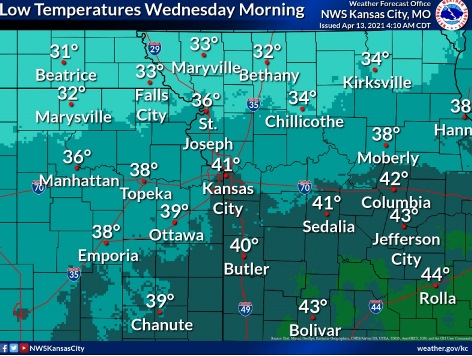The state of Kansas is suspending administration of Johnson and Johnson COVID-19 vaccine after reports of blood clots in six cases nationally.
Dr. Lee Norman, Kansas secretary of health, said at a news conference Tuesday morning held by the University of Kansas Health System in Kansas City, Kansas, that Kansas is putting a pause on administering the Johnson and Johnson vaccine while federal agencies look at these cases.
It was reported earlier Tuesday that the FDA and CDC would investigate six cases of cerebral blood clots reported nationally.
Dr. Norman added that there has not been a case to their knowledge that has been reported in Kansas.
He said he doesn’t think this would be a huge setback to the vaccine distribution system in Kansas. In the past several weeks, Kansas had been scheduled to receive more of the Johnson and Johnson vaccine, but it never materialized – a smaller amount was received, he said.
There were some Johnson and Johnson vaccination clinics scheduled for 8 a.m. Tuesday, and those were put on hold, he added. The KDHE is recommending to shift and use the two existing vaccines, Moderna and Pfizer, he added.
According to doctors at the news conference, the finding of blood clots affected only the Johnson and Johnson vaccine, in women ages 18 through 48, and did not involve the Moderna or Pfizer vaccines.
Dr. David Wild, vice president of performance improvement, said the reports about the Johnson and Johnson vaccine are a signal that the safety mechanisms are working as designed. Blood clots were found in six cases out of 6.8 million, making it a “one in a million” event, according to Dr. Wild.
Dr. Dana Hawkinson, medical director of infection prevention and control at the health system, agreed that this is an indication that people are monitoring the vaccines 24 hours a day to make sure they are safe. He said the process has been transparent.
According to other reports, the blood clots were more likely to occur up to 13 days after the Johnson and Johnson dose was received, Dr. Hawkinson said.
Dr. Wild said the KU Health System had not given out any Johnson and Johnson vaccines in the Kansas City area. They have plenty of other vaccines, Moderna and Pfizer available, he said, and they will continue giving those.
The doctors commented that they believe vaccinations, along with masking, will continue to be the way to stop the spread of COVID-19 variants in Kansas. So far, the number of variants identified here is low, according to the doctors.
One-third of Kansas residents have already received at least one dose of vaccine, according to state officials.
The state will receive 39,780 Pfizer first doses, 38,610 Pfizer second doses, 29,000 Moderna first doses and 27,800 Moderna second doses during the week of April 19, according to the KDHE.
The CDC has scheduled an emergency meeting of its advisory committee on Wednesday.
The KDHE stated Tuesday that those who have received the Johnson and Johnson vaccine should contact their health care provider if they have any symptoms and report any illness to the VAERS Reporting System, https://vaers.hhs.gov.
The joint CDC and FDA statement:
“As of April 12, more than 6.8 million doses of the Johnson & Johnson (Janssen) vaccine have been administered in the U.S. CDC and FDA are reviewing data involving six reported U.S. cases of a rare and severe type of blood clot in individuals after receiving the J&J vaccine. In these cases, a type of blood clot called cerebral venous sinus thrombosis (CVST) was seen in combination with low levels of blood platelets (thrombocytopenia). All six cases occurred among women between the ages of 18 and 48, and symptoms occurred 6 to 13 days after vaccination. Treatment of this specific type of blood clot is different from the treatment that might typically be administered. Usually, an anticoagulant drug called heparin is used to treat blood clots. In this setting, administration of heparin may be dangerous, and alternative treatments need to be given.
“CDC will convene a meeting of the Advisory Committee on Immunization Practices (ACIP) on Wednesday to further review these cases and assess their potential significance. FDA will review that analysis as it also investigates these cases. Until that process is complete, we are recommending a pause in the use of this vaccine out of an abundance of caution. This is important, in part, to ensure that the health care provider community is aware of the potential for these adverse events and can plan for proper recognition and management due to the unique treatment required with this type of blood clot.
“Right now, these adverse events appear to be extremely rare. COVID-19 vaccine safety is a top priority for the federal government, and we take all reports of health problems following COVID-19 vaccination very seriously. People who have received the J&J vaccine who develop severe headache, abdominal pain, leg pain, or shortness of breath within three weeks after vaccination should contact their health care provider. Health care providers are asked to report adverse events to the Vaccine Adverse Event Reporting System at https://vaers.hhs.gov/reportevent.htmlexternal icon.”

